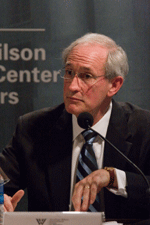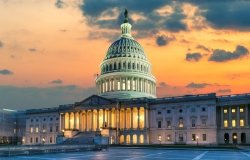Congress and America's Future in Space: Pie in the Sky or National Imperative?
with Chuck Atkins, Chief of Staff to the House Committee on Science and Technology under Chairman Bart Gordon (D-Tenn.); Lori B. Garver, former NASA Associate Administrator; Howard E. McCurdy, Professor and Chair, School of Public Affairs, American University; Marc Kaufman, staff writer, Washington Post
Overview
Panelists: Professor Howard E. McCurdy, Chairman, School of Public Affairs, American University; Chuck Atkins, Chief of Staff, House Committee on Science and Technology; Lori B. Garver, former Associate Administrator for Policy and Plans, NASA; and Marc Kaufman, Reporter, The Washington Post
America must continue with its scientific exploration of outer space, though the costs of building a space station on the Moon as a launch pad for sending astronauts to Mars and beyond—-estimated by some at over $400 billion--may be too much for Congress and the public to swallow.
 That was the consensus of a panel of experts at the Congress Project Seminar on Congress and America's Future in Space. Professor Howard E. McCurdy of American University traced the history of America's space program while exploding "the myth of presidential leadership in space." According to that myth, says McCurdy, all the President has to do is move his lips and say the words, and it will be done. But that ignores both the independence of Congress and the ways of the NASA bureaucracy. Congress sometimes says "no" and sometimes, "go slow." While Congress did largely defer to the President during the 1960s when John F. Kennedy called for putting a man on the moon within the decade, that began to change with the next stages of our space program. When President George W. Bush announced in 2004 his "Vision for Space Exploration," which included building a Moon station for manned flights to Mars, he was recycling an idea that's been kicked around for the last 50 years, says McCurdy. In fact, in 1989 Bush's father called for the exact same thing, calling it the "Space Exploration Initiative." But it died a natural death in Congress.
That was the consensus of a panel of experts at the Congress Project Seminar on Congress and America's Future in Space. Professor Howard E. McCurdy of American University traced the history of America's space program while exploding "the myth of presidential leadership in space." According to that myth, says McCurdy, all the President has to do is move his lips and say the words, and it will be done. But that ignores both the independence of Congress and the ways of the NASA bureaucracy. Congress sometimes says "no" and sometimes, "go slow." While Congress did largely defer to the President during the 1960s when John F. Kennedy called for putting a man on the moon within the decade, that began to change with the next stages of our space program. When President George W. Bush announced in 2004 his "Vision for Space Exploration," which included building a Moon station for manned flights to Mars, he was recycling an idea that's been kicked around for the last 50 years, says McCurdy. In fact, in 1989 Bush's father called for the exact same thing, calling it the "Space Exploration Initiative." But it died a natural death in Congress.
 House Science and Technology Committee Staff Director Chuck Atkins characterized the varying degrees of support in Congress for space programs by conjuring four fictional caucuses. "The Parochial Interest Caucus" is made up of Members from states that have NASA and aerospace facilities. They are motivated by economic interests and constituent jobs. "The Strategic Imperative Caucus" consists of those for whom the Cold War has not ended. China is now the main threat with its growing space efforts, and the U.S. cannot cede outer space to them because of its potential for military use. "The Luke-warm Caucus" thinks space is kind of interesting, that it would be nice to explore, but that it provides no real economic benefits for their states. Its Members pay little attention to what our program is, and their votes tend to fluctuate between support and opposition. Finally, "The Alternative Priorities Caucus" thinks "space is a luxury" and that the money would better be spent on solving problems on Earth.
House Science and Technology Committee Staff Director Chuck Atkins characterized the varying degrees of support in Congress for space programs by conjuring four fictional caucuses. "The Parochial Interest Caucus" is made up of Members from states that have NASA and aerospace facilities. They are motivated by economic interests and constituent jobs. "The Strategic Imperative Caucus" consists of those for whom the Cold War has not ended. China is now the main threat with its growing space efforts, and the U.S. cannot cede outer space to them because of its potential for military use. "The Luke-warm Caucus" thinks space is kind of interesting, that it would be nice to explore, but that it provides no real economic benefits for their states. Its Members pay little attention to what our program is, and their votes tend to fluctuate between support and opposition. Finally, "The Alternative Priorities Caucus" thinks "space is a luxury" and that the money would better be spent on solving problems on Earth.
Atkins noted that while Congress did endorse President Bush's "Vision for Space Exploration" in 2005, the Administration has failed to propose the budgetary resources necessary to launch it at the same time we are spending money to complete the space station using our three remaining shuttles. Another problem is that when the shuttles are retired in 2010 there will be a five year gap until our next space vehicles "Orion-Aries" are operational. Atkins sees the three great challenges for the future of our space programs being "the fiscal ability and will" needed to fulfill our goals given the costs of war, entitlements, and other domestic needs; the growing imbalance between NASA's scientific research and manned space exploration missions; and the question of future leadership at NASA.
Lori Garver answered the question of "pie in the sky or national imperative?" by saying, "If it is not an imperative, we aren't going to do it." Disagreeing somewhat with McCurdy, she asserted that Congress does not make dramatic changes in NASA's budgets and does tend to defer to the President's proposals. She thinks Congress may be changing in its approach to space policy and will begin to "legislate more broadly." But then, "that may just be wishful thinking." Just as the Soviet launch of the first satellite in 1957 and first man in space in 1961 were "focusing events" that got the U.S. off the dime and into space, she thinks the next focusing event to spur us forward in space will be global climate change and the need for more scientific weather monitoring. A recent National Academy of Sciences report faults NASA for slighting this aspect of our space efforts in favor of the manned programs. Garver quoted a friend in the aerospace industry as saying, "America will never turn its back on manned space exploration." But she said she is a bit more skeptical. "We haven't made the case yet for going back to the Moon, let alone on to Mars."
Washington Post reporter Marc Kaufman says news of shuttle flights and the space station seldom make the front page anymore, and that the American people seem to have lost interest in manned space flight. They are more intrigued by pictures taken by the Hubble Telescope of other galaxies and stories about exploding stars and black holes. NASA Administrator Michael Griffin's recent testimony about increasing Chinese space capabilities is grabbing some attention and comment in Congress, but it's not clear whether it will be perceived as a sufficient threat to warrant going back to the Moon.
Garver observed that throughout history, the main reasons people have undertaken massive projects, from building the Pyramids to flying to the moon, have been "fear, greed, or glory"-—all of which can be found in Atkins's fictional congressional caucuses. Both she and McCurdy noted that much of future space travel will be carried out by private enterprise entrepreneurs who do not face the same costs as government-sponsored efforts because they are willing to take risks that the government would never allow. Garver thinks some day space will be our great escape route if mankind continues to destroy this planet.
Thank you for your interest in this event. Please send any feedback or questions to our Events staff.










